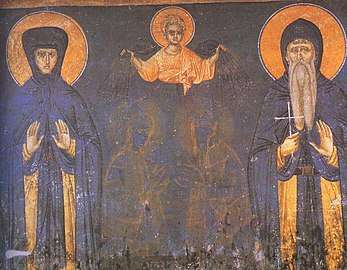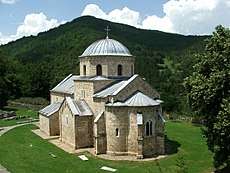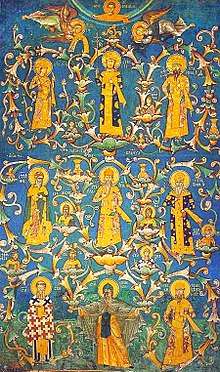Helen of Anjou
Helen of Anjou (Serbian: Jelena Anžujska/Јелена Анжујска, pronounced [jɛ̌lɛna ǎnʒuːjskaː]; c. 1236 – 8 February 1314) was the Queen consort of the Serbian Kingdom, as spouse of King Stefan Uroš I. Her children were later kings Stefan Dragutin and Stefan Milutin. She is remembered for having commissioned many religious works.[1]
| Helen of Anjou | |
|---|---|
 Helena and her son, King Stefan Milutin, a fresco from Gračanica monastery | |
| Queen consort of Serbia | |
| Tenure | around 1245 – 1276 |
| Born | about 1236 |
| Died | 8 February 1314 Church of St. Nicholas, Shkodër |
| Burial | |
| Spouse | Stefan Uroš I |
| Issue |
|
| Religion | Roman Catholic, then Serbian Orthodox |
| Signature |  |
Life
Origin
Her origin is not known for certain;[2] she was born in ca 1236, and the biography of Archbishop Danilo states that "she was of a French family" and a continuator of the work that "the family was of royal or imperial blood".[3] John Fine, Jr. states that she was "of Catholic and French origin, probably of the House of Valois".[4] According to Europäische Stammtafeln, she descended from a side branch of the Byzantine emperor's family and the Hungarian royal house, in which case she may have been the daughter of John Angelus of Syrmia and a sister of Maria Angelina, wife of Anselm de Keu (Anseau de Cayeux), Captain General in Albania for Charles I of Naples. Charles I mentioned her as a relative in a letter dated 1273. She may have been the granddaughter of the sister of Baldwin II of Constantinople.
In 1280, Charles I of Sicily issued documents to Maria Angelina allowing her to travel from Apulia to Serbia to visit "her sister the queen of Serbia". Maria Angelina's parents are known from her marriage license, issued in 1253 by the pope, as Calojohanni and imperatore Constantinopolitano, eiusdem Matildis avunculo...Matildis dominæ de Posaga, natæ comitissæ Viennensis, that is, Kaloioannes Angelos, lord of Srem, and Mathilde, daughter of Marguerite de Courtenay (the sister of the Latin emperors Robert and Baldwin II) and Henry I, Count of Vianden.[5]
Queen consort

Helen married Uroš I around 1245.[6] With Uroš I she had at least four children:
- Dragutin, Serbian king 1276–1282[7]
- Milutin, Serbian king 1282–1321[7]
- Stefan, died young
- Brnjača, daughter
For some time, she was a ruler of Zeta, Travunia, Plav and Poibarje. During that time, Serbia was divided into three parts, and the rulers of the other two parts were Dragutin and Milutin. Helen became a nun at the Church of St. Nicholas in Shkodër, where she died on 8 February 1314.
Helen of Anjou significantly contributed to the cultural rise of the medieval Serbian state. She had the first library at the court and encouraged transcription of books in monasteries.[8] She founded the first girls' school in medieval Serbia. Helen's palace was in modern Kosovo, in the town of Brnjak (sometimes called "Brnjaci", but not the place of that name in Bosnia and Herzegovina), on Mokra Gora mountain (not to be confused with Mokra Gora village), where the school was located. Other than this palace, she possessed the town of Jelač at Rogozna mountain. As did other Nemanjićs, she built monasteries. She built the Gradac Monastery, where she was buried, the Church of St. Nicholas in Shkodër where she died, and the Shirgj Monastery.[9] She had repaired and rebuilt many churches and monasteries around Lake Skadar that had been devastated by the Mongol invasion of 1242.[10]
Legacy
Helen of Anjou was canonized by the Serbian Orthodox Church. Her feast day is 12 November [O.S. 30 October].[11]
Lilacs were planted along the Ibar River to welcome Helen of Anjou to her new home in Serbia. Her husband planted them to remind her of her home in Provence. This area is now known as the Valley of the Lilacs.[8]
See also
- Jefimija
- Princess Milica of Serbia
- Saint Angelina of Serbia
- Mara Branković
- Olivera Despina
- Jelena Balšić
- Simonida
- Maria Angelina Doukaina Palaiologina
References
- Byzantium: Faith and Power (1261-1557). 2004. ISBN 9781588391131.
- Chrissis, Dr Nikolaos G.; Kedar, Professor Benjamin Z.; Phillips, Professor Jonathan (2015-12-28). Crusades: Volume 14. ISBN 9781472468413.
- McDaniel ´John Angelos and Queen Jelena´, citing Makushev, V. ´Itallianskie arkhivy i khranisashchiesia v nikh materialy dlia slavianskoi istorii´, Sbornik Otdelelniia Russkogo Iazyka i Slovesnosti, VIII/4 (1871), pp. 30-33.
- Fine, Jr., John V. A. (1994). The late medieval Balkans: a critical survey from the late twelfth century to the Ottoman Conquest. Ann Arbor: University of Michigan Press. p. 220. ISBN 9780472082605.
- McDaniel 1984, p. 43-50.
- Vladimir Ćorović "Istorija srpskog naroda": Zapadnjačka orijentacija u Srbiji Archived 2014-04-12 at the Wayback Machine (in Serbian)
- Celia Hawkesworth, Voices in the Shadows: Women and Verbal Art in Serbia and Bosnia, (Central European University Press, 2000), 65.
- (in Serbian)
- Ndreca, Ardian (14 September 2008). "Rrënojat e Abacisë së Shirgjit dhe shpëtimi i tyne". Gazeta 55 (in Albanian). Archived from the original on 31 January 2016. Retrieved 18 January 2015.
- Carl Patsch (1993) [1927], "Montenegro", in M. T. Houtsma; A. J. Wensinck; E. Lévi-Provençal; H. A. R. Gibb; W. Heffening (eds.), E. J. Brill's First Encyclopaedia of Islam, 1913–1936, Vol. 5, Leiden: Brill, pp. 555–60CS1 maint: ref=harv (link), at 556.
- Srpsko nasleđe: Sveta Jelena Anžujska Archived 2011-07-28 at the Wayback Machine (in Serbian)
Sources
- McDaniel, Gordon L. (1984). "On Hungarian-Serbian Relations in the Thirteenth Century: John Angelos and Queen Jelena" (PDF). Ungarn-Jahrbuch. 12 (1982-1983): München, 1984: 43–50.CS1 maint: ref=harv (link)
- Stevanović, Miladin (2004). Kraljica Jelena Anžujska. Knjiga-komerc. ISBN 9788677120320.
- Miodrag Al Purković (1956). Princeze iz kuće Nemanjića. AV ALA printing and publishing.
External links
| Wikimedia Commons has media related to Helen of Anjou. |
- Letter from Helen of Anjou 1267(1268)
- Letter from Helen of Anjou (1289)
- Letter from Helen of Anjou(1304)
- Srpsko nasleđe: Nemanjići i žene (in Serbian)
- Manastir Gradac: Gradila ga Jelena Anžujska (in Serbian)
- Portreti kraljevske porodice Nemanjića na istočnom zidu Sopoćana (in Serbian)
| Royal titles | ||
|---|---|---|
| Preceded by Beloslava of Bulgaria |
Queen consort of Serbia 1245–1276 |
Succeeded by Catherine of Hungary |
| Preceded by Stefan Uroš I |
Queen of Zeta, Travunia, Plav and Poibarje 1276–1309 |
Succeeded by Stefan Uroš III |

